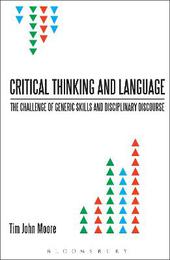
|
Critical Thinking and Language: The Challenge of Generic Skills and Disciplinary Discourses
Paperback / softback
Main Details
| Title |
Critical Thinking and Language: The Challenge of Generic Skills and Disciplinary Discourses
|
| Authors and Contributors |
By (author) Dr Tim John Moore
|
| Physical Properties |
| Format:Paperback / softback | | Pages:272 | | Dimensions(mm): Height 234,Width 156 |
|
| Category/Genre | Philosophy - logic |
|---|
| ISBN/Barcode |
9780567157737
|
| Classifications | Dewey:160 |
|---|
| Audience | | Tertiary Education (US: College) | |
|---|
|
Publishing Details |
| Publisher |
Bloomsbury Publishing PLC
|
| Imprint |
Bloomsbury Academic
|
| Publication Date |
28 March 2013 |
| Publication Country |
United Kingdom
|
Description
This book clarifies the idea of critical thinking by investigating the 'critical' practices of academics across a range of disciplines. Drawing on key theorists - Wittgenstein, Geertz, Williams, Halliday - and using a 'textographic' approach, the book explores how the concept of critical thinking is understood by academics and also how it is constructed discursively in the texts and practices they employ in their teaching. Critical thinking is one of the most widely discussed concepts in debates on university learning. For many, the idea of teaching students to be critical thinkers characterizes more than anything else the overriding purpose of 'higher education'. But whilst there is general agreement about its importance as an educational ideal, there is surprisingly little agreement about what the concept means exactly. Also at issue is how and what students need to be taught in order to be properly critical in their field. This searching monograph seeks answers to these important questions.
Author Biography
Tim John Moore is a Senior Lecturer at the Swinburne University of Technology, Australia and an Adjunct Research Associate at Monash University, Australia
ReviewsTim John Moore makes abundantly clear that his goal in writing Critical Thinking and Language was to facilitate better teaching of critical thinking at university level ... I applaud both Moore's intentions with the book, and also his overarching method ... I have not found a more concise yet in-depth handling of the topic ... was won over ... by the depth and breath of the investigation, by Moore's adroit discourse analysis and interpretations ... and by the heuristic value of his insights and conclusions ... The study served a valuable purpose for me. * Discourse Studies * [A] well-written and thoughtful study ... University teachers and program administrators looking to foster critical thinking ... can find much food for thought in this contribution. * JALT Journal * In this informative, well-researched and accessible book, Tim Moore traverses the critical thinking landscape to ascertain exactly what the term encompasses ... The strength of this book is that it does make you think. * Australian Review of Applied Linguistics * The topic ... is a timely one as discussions reverberate around the world about possible dilutions of undergraduate academic standards as the pools of students entering tertiary education continue to increase. The topic also has considerable intrinsic interest since the precise nature of what is meant by "critical thinking" is both contested and variable; in effect, "criticalness", for many, can stand as a surrogate for one of the defining characteristics of the academic world. Interestingly, the author explores this issue not -- as might be expected -- through whether first year undergraduates can indeed be suitably critical in their tutorials or written work, but through the lenses of their instructors, through what they say in interviews, write in their introductory manuals, or ask for in their exercise and essay rubrics. * Professor Emeritus John M. Swales, University of Michigan, USA * A beautifully written analysis of the key term "critical thinking" as defining academic expectations of students, especially international students, and an illuminating exploration of the notion of disciplinarity. This book is a "must-read" for those framing policy in higher education, for researchers on academic literacy, and for writing and language instructors helping students to face its complex demands. * Tim McNamara, Professor of Linguistics and Applied Linguistics, The University of Melbourne, Australia *
|